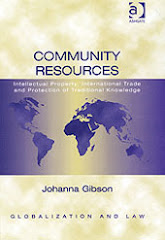
Today, the WTO reconvened intellectual property talks ahead of the forthcoming December ministerial in Hong Kong. Of particular interest to the Patenting Lives project is that the talks considered the patentability of life forms and the review of the exception to optional patenting of plants and animals, found in Article 27.3(b) of the TRIPS Agreement. Related to the question of patents on life are proposals to require mandatory disclosure of origin in patent applications (particularly relevant to community autonomy with respect to its genetic resources, medicinal knowledge, and other forms of traditional knowledge) and the protection of traditional knowledge and folklore.
In today's discussions, a decision was reached on the extension of the transition period for least-developed countries (LDCs) for implementation of the TRIPS Agreement. This is significant with respect to patents, and the impact on local and traditional communities of patents incorporating traditional knowledge as well as the socio-cultural impact of life patents on diverse communities and indigenous groups. The members decided to grant an extension until 1 July 2013, with reference to trade marks, copyright, patents, and other forms of intellectual property covered by the TRIPS Agreement. The decision on paragraph 6 of Doha (with respect to patents for pharmaceutical products) is not affected and the extension until 2016 for LDCs remains in place.
This is a significant decision in that it extends the transition period by a further 7.5 years. However, in granting an extension, the immediate problems and questions regarding the broader implications of an ultimately global system remain under-examined a
 nd indeed are effectively deferred. It may even be suggested that an increasingly global coverage of bilateral trade agreements and "contractual" law-making will make the implementation by this deadline almost redundant. Indeed, the decision states that if LDCs voluntarily provide intellectual property protection (as, for example, in bilateral agreements), then TRIPS provisions on non-discrimination must be observed and the countries "have promised not to reduce or withdraw the current protection they give."
nd indeed are effectively deferred. It may even be suggested that an increasingly global coverage of bilateral trade agreements and "contractual" law-making will make the implementation by this deadline almost redundant. Indeed, the decision states that if LDCs voluntarily provide intellectual property protection (as, for example, in bilateral agreements), then TRIPS provisions on non-discrimination must be observed and the countries "have promised not to reduce or withdraw the current protection they give."



No comments:
Post a Comment